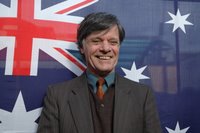The Victorian government now charges home buyers around $18,000 in stamp duty when purchasing an average house in Melbourne and close to that amount in provincial cities such as Geelong and Ballarat. What is less well known is that at the end of 2005 the state government also introduced a new "development tax" that works out to around $5,000 to $8,000 for houses in new estates. This amount is also now being passed onto new home buyers. These burdens form part of the reason why buying a home is becoming impossible for a growing number of Victorians.
The Democratic Labor Party has always placed a high priority on helping families to buy a home. Indeed, today’s help from the Commonwealth for first home buyers has evolved from earlier schemes initiated by the DLP decades ago.
In assisting a family to buy a home, governments help not only an individual but all members of a family - for life. Home ownership makes families less dependent on governments in the long term. It eliminates the need for the provision of rent assistance for example. By ending the need to pay rent, home ownership also increases resilience to economic downturns. A high rate of home ownership goes some way towards equalising the distribution of wealth. It gives all family members a sense of security and a feeling of sharing in the ownership of the country. This can only be beneficial to the long term health of our society.
Our taxation system gives huge benefits to investors (negative gearing and depreciation) but not to those struggling to buy a family home. The result is that a minority of people now own lots of properties while many families can no longer afford to buy even one.
The state government now depends on collecting huge sums in the form of stamp duty on real estate. This burden is heavy but probably manageable for those who are upgrading accommodation and have very likely benefited from capital appreciation. It is a different matter for those who are struggling to acquire a first home to simply put a secure roof over their children’s heads.
Of course it is easy for any candidate to argue against taxes. Voters are entitled to ask where the money for reducing stamp duty revenues is to come from. It would be also easy to answer that the state government should stop funding the painting of trees blue in parks for example, as it agreed to do quite recently. No doubt the expenditure on this kind of stupidity is a waste that should be stopped but it is also fairly minor in terms of total government spending. There is very serious money being misused however by the state government on advertising itself. The Bracks’ government is spending around $130 million on advertising per year, much of which is clearly intended to advantage the ALP. This expenditure should stop and the savings used to fund, among other things, cutting or eliminating stamp duty for first home buyers
If elected to represent Western Victoria in the Upper House I will propose and argue that there should be very significant stamp duty concessions for all first home buyers and that for families with children who are buying a first home, stamp duty should be entirely abolished.







